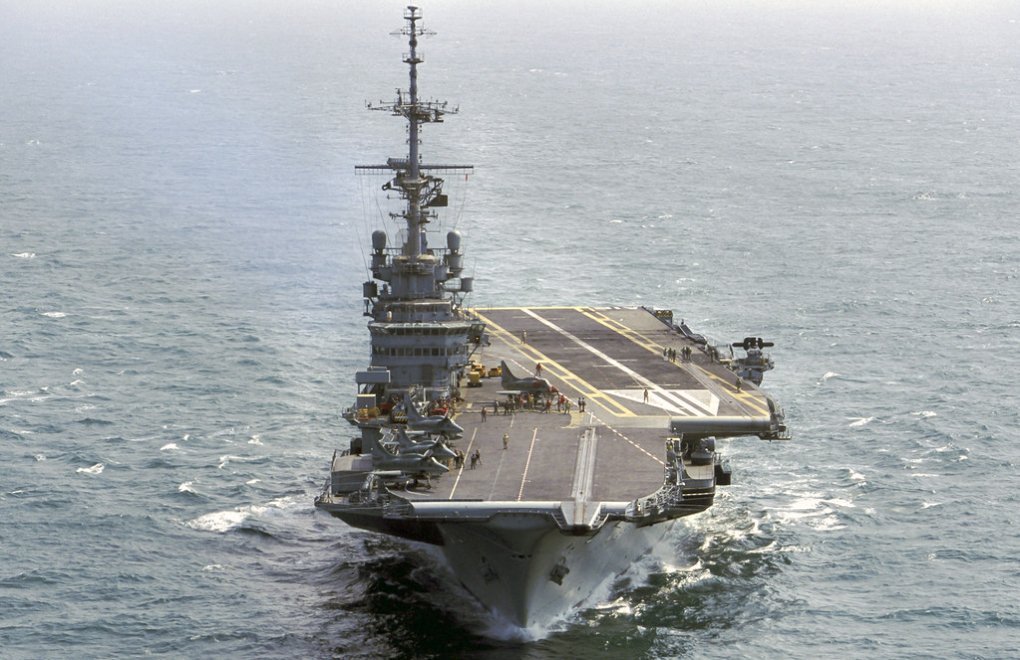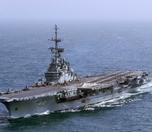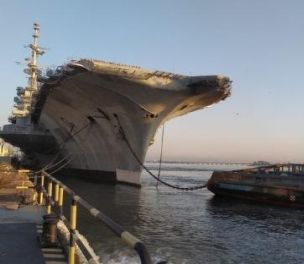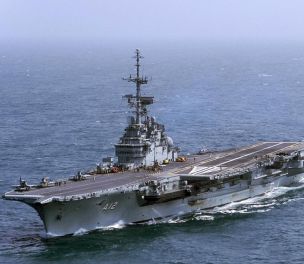NAe São Paulo in 2002 (Photo: Rob Schleiffert/Flickr)
Click to read the article in Turkish
Brazil has turned down a request from Türkiye for a new hazardous materials report for the NAe São Paulo aircraft carrier, which is being towed to Türkiye for dismantling.
On August 9, the Ministry of Environment sent an "urgent" letter to the Brazilian Institute of Environment and Renewable Natural Resources (IBAMA), demanding that a new report be written in Brazil's territorial waters.
The ministry said in the letter that it made the request after "reports in the press that the Brazilian Supreme Court issued a temporary injunction and dangerous substance notifications made to our ministry."
The ship was reportedly in the Atlantic Ocean, approaching to the Strait of Gibraltar at the time when the letter was sent. It is expected to reach the strait within a few days.
"Not a Supreme Court decision"
In its response, the IBAMA said it was not a party to the legal proceedings in question, and the court verdict had not been issued by the Supreme Court but by a first degree judge. Therefore, the decision was subject of appeal, it noted.
"The legal process was initiated by a Brazilian NGO named Instituto Foch. Its founder has a personal wish to turn the old vessel into a museum," said the institute.
The institute further noted that the vessel had already left Brazil's territorial waters when Türkiye made the request, citing information from Brazil's Naval Forces.
"Notwithstanding, we acknowledge your request for a new inventory of hazardous materials report. We have informed the export company about the content of your letter and requested a response within 72 hours of our notification.
"Immediately after we receive the answer, we will send you a copy, so all Competent Authorities involved will be able to make decisions or take actions based on shared information."
A Türkiye-based company, Sök Denizcilik, got the contract last year for the dismantling of the ship. Environmental groups in Türkiye have called for the cancellation of the contract due to the high amount of dangerous substances contained by the ship, including asbestos.
What will happen now?
Gökhan Ersoy, a project leader with the Greenpeace Mediterranean, said Türkiye clearly state that it doesn't accept the first dangerous materials report, after which it conditionally approved the dismantling of the ship in the western city of İzmir.
"If the Brazilian authorities and the company do not cooperate in line with this decision, official communication with the transit countries should start immediately and the convoy should return to Brazil," he said.
Jim Puckett, the general director of the Basel Action Network, said Türkiye should not accept a new investigation on the ship to be carried out in a third country.
Aslı Odman, an academic and a volunteer for the Health and Safety Labor Watch (İSİG), said Brazil's rush to get the ship out of its territorial waters "can't be an excuse for accepting this ship in our country."
"This ship should be returned immediately. It shouldn't even be allowed to enter the Mediterranean,"she said.
What happened?The NAe São Paulo, a decommissioned aircraft carrier belonging to Brazil's navy, is set to be dismantled in the Aliağa shipyard in İzmir, western Türkiye. A company named Sök Denizcilik got the contract for the dismantling of the vessel last year and was given clearance by the Ministry of Environment, Urbanization and Climate Change on May 30. The size of the São Paulo vessel and the harmful materials that can be released by dismantling the vessel, including asbestos, caused environmental concerns. Minister of Environment Murat Kurum on July 18 dismissed the reports that the vessel contained 900 tons of asbestos and said it contained only 9.6 tons of asbestos, citing a survey report. When the vessel enters Türkiye's territorial waters, it will be once again examined by "experts with international competence" and will be sent back immediately if there is a dangerous situation, he had said in a statement on his social media account. The report cited by Kurum was prepared by the Grieg Green company, according to the Demirören News Agency (DHA), which said it had obtained the survey report including information on how much asbestos is found in which parts of the vessel. However, the sister vessel of São Paulo, Clemenceau, was revealed to be containing more than 500 tons of asbestos during its dismantling in the mid-2000s, Evrensel newspaper reported. The government of France, which had built both vessels, initially stated in 2005 that the ship contained 160 to 200 tons of asbestos. Before the ship was dismantled in the UK between 2009 and 2010, analyses had found 760 tons of asbestos. |
Ship dismantling in İzmirAfter a ship accident on March 22, 2013, oil sludge spilled into the sea and the Çandarlı beach of Dikili district was covered with oil sludge. Two years after this accident, a tanker named Kuito with a daily oil processing capacity of 100,000 barrels, which was brought to Aliağa for dismantling, was investigated five times more radioactivity than limit values was detected. A lawsuit was filed for the cancellation of the dismantling but the İzmir 3rf Administrative court ruled for the stay of execution months after the ship was dismantled. A similar process happened with the ETHANE ship. In 2018, it was revealed that oil was deliberately discharged from a ship named Harrier and oil pollution was observed on Foça coasts. Substances such as mineral oils, heavy metals, polycyclic aromatic hydrocarbons (PAH), polychlorinated biphenyls (PCB), asbestos, organotin compounds, dioxin are listed as environmental pollutants in shipbreaking plants. These pollutants get into the air. European countries and the US have withdrawn from the ship dismantling sector since the 1980s. |
(VK)







